Book Digest: October 22, 2007
From Red Rover by Deidre McNamer:
The Paris Review Interviews, Part II edited by Philip Gourevitch
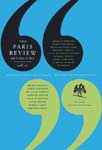
Apparently, wiser or at least more modest heads have prevailed at the Paris Review and the hyperbolic claim of their interviews being the “DNA of literature” seems to have been dropped. This second volume has 16 interviews, including William Faulkner, Toni Morrison, Isaac Bashevis Singer, Graham Greene, Philip Larkin, Eudora Welty, Peter Carey, Gabriel García Márquez, Stephen King, and James Baldwin, and an introduction by Nobel Laureate Orhan Pamuk.
Napoleon’s Egypt: Invading the Middle East by Juan Cole

As the bibliography of the disaster known as the Bush administration grows, a useful early distinction will be chronicle versus analysis and context. Cole, a thoughtful and imaginative scholar, offers the latter with his account of an earlier, disastrous attempt to interfere in the Arab world. As the New York Times’s Stephen Kinzer points out: “Cole’s book reminds us that today’s leaders are not the first to find the Islamic world far more complex than they imagined. It not only offers delicious stories about the private lives of invaders, but also teaches urgent lessons for the modern age.”
BibliOdyssey: Amazing Archival Images From the Internet by PK
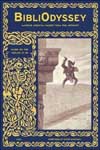
This is a wonderfully odd collection of images that the mysterious author explains in this way:
The book (like the site) covers a very wide spectrum of styles, time periods and subject matter. You can expect everything from astronomy to zoology and from Art Nouveau to the Renaissance, in something reminiscent of what I call a multi-post (except on steroids and growth hormone and with better grooming habits and no noisy computer fan in the background). I like to think that the trajectory of the book aims somewhere roughly between our internet users’ penchant for a concentrated package of beguiling ephemera and as an introductory overview of the cultural wealth accessible from web archives for luddites.
Option$: The Secret Life of Steve Jobs a parody by Fake Steve Jobs

I’m not sure who cares enough about Apple’s Steve Jobs to read a book-length parody (though in this case the send-up extends to what might be construed as a Silicon Valley ethos), except for the Mac-user community, whose misplaced reverence became apparent with the greed Apple exhibited in their iPod conquests. Does this seem like Jobs? “It’s like in one of those movies where a guy realizes he’s got telekinetic powers and it’s just too bad if he doesn’t want them, he’s got them. Likewise, I have this gift. It’s who I am.” Of course it doesn’t, but that’s the joke, and it’s a good one indeed.
Filthy Shakespeare: Shakespeare’s Most Outrageous Sexual Puns by Pauline Kiernan

There is something juvenile about a serious literary scholar compiling 70 examples of Shakespeare’s mastery of the sexual pun or, as the publisher explains, “unlocking the meaning behind the coded words.” And judging from the plethora of reviews by outlets normally deaf to news of Shakespeare, this juvenile gambit has paid off. One hopes Bill Bryson’s new book on the Bard gets at least some of this attention.
Last Night at the Lobster by Stewart O’Nan
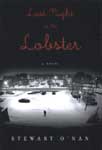
Speaking of the Bard, O’Nan, who has been referred to as the “the bard of the working class,” has a new opus featuring his trademark ramshackle lives trying to eke something out of tough conditions. In this case, Manny DeLeon, whose Red Lobster is to shut down by orders from corporate, tries to juggle a number of balls—his staff, his clients, his pregnant girlfriend, and the girl with whom he is really in love—less than a week before Christmas.
Orpheus Lost by Janette Turner Hospital

I finally discovered Hospital after she had already compiled a substantial body of work, and I will be surprised if this winner of Australia’s Patrick White Award for lifetime literary achievement doesn’t, in large part based on this tome, gather herself a wider audience. Hospital recasts the Orpheus myth against the background of a world wracked with fear and anxiety over imminent terrorist incidents. Southerner Leela meets and becomes lovers with an Australian musician in Boston. After a subway explosion, Leela is picked up for interrogation and, naturally, now her lover may not be what her seems. Her travels and travails in searching for her lover are the plot; mythology and Hospital provide the rest.
» Read an excerpt from Orpheus Lost
Matrimony by Joshua Henkin

Wealthy Julian Wainwright, impecunious Carter Heinz, and beautiful Canadian Jewess Mia Mendelsohn meet in college in western Massachusetts in the late ‘80s. Julian and Mia have a love affair and marry, and some 10 years later Carter reappears, now in the employ of a West-Coast internet company. Havoc and turmoil ensue. Maybe not so promising, except for this blurb by Michael Cunningham: “In the tradition of John Cheever and Richard Yates… a novel about love, hope, delusion, and the intricate ways in which time’s passage raises us up even as it grinds us down. It’s a beautiful book. Here’s to its brilliant future.”
» Read an excerpt from Matrimony
The Pleasures of the Damned: Poems, 1951-1993 by Charles Bukowski
John Martin, formerly of Black Sparrow Press, which originally published Bukowski, continues to add to the already sizeable body of his published work. The only thing I can’t figure out is why “The Secret of My Endurance” is not included in this collection. Here’s Bukowski reading that poem.
The Lamentations of Julius Marantz by Marc Estrin
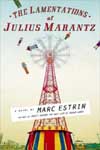
Vermonter Estrin who, if not a polymath, is a talented amateur cellist and puppeteer and dare I say novelist. Here he offers up another of his unorthodox characters in a rumination on overzealous religiosity and cold-hearted scientific speculation. And yes, something of a commentary on the Christian rapture. If anyone can handle this odd mélange, it is Estrin.
» Read an excerpt [pdf] from The Lamentations of Julius Marantz
Classics for Pleasure by Michael Dirda

Apparently there is no lack of appetite for books in which professional readers like Dirda (a Pulitzer-winning critic for the Washington Post) reiterate the value or delights of an assortment of classics. This, of course, makes sense if you hunger for more literary wisdom and insights, but not if you need to be convinced to put aside the latest Left Behind or Steve Almond book. In this case, Dirda, who has an infectious love of literature, takes on almost a hundred widely varied titles.
» Read an excerpt from Classics for Pleasure
Touch and Go by Studs Terkel
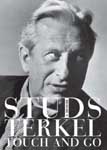
I agree with Margaret Atwood: “By now the man requires an adjective of his own… Terkelesque.” As Louis “Studs” Terkel has been chronicling all manner of American people and things (with a dozen highly regarded bestsellers), large and small, for the better part of his 95 years. An update or addendum to his first memoir, Talking to Myself, has been long overdue. By the way, Studs lives in Chicago.
